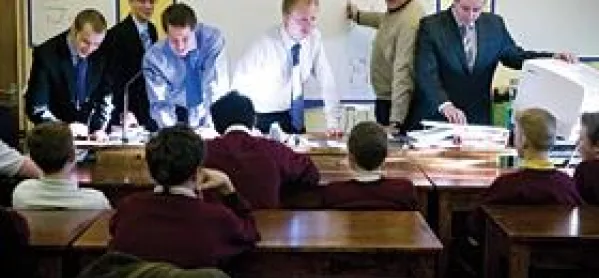Those who can, but don’t want to teach

The brightest graduates are being promised large sums of money if they sign up to become a teacher, and a high-profile advertising campaign is extolling the joys of the profession. But despite the promotion and the generous bursaries for those with the best degrees, far too few people have been signed up to start teacher training this September, official statistics show.
So far, 6,801 people have been accepted to secondary PGCE courses, compared with 7,491 in 2011 - a fall of 9.2 per cent.
Sam Twiselton, dean of the Faculty of Education at the University of Cumbria, said she has “concerns” that the fall could lead to an “under- supply” of secondary teachers and numbers being cut on courses next year. “Universities can’t afford to under-recruit as this may have an impact on the allocation of places on courses that they are given in the future,” she said.
The dip in applicants accepted to courses is matched by a fall in overall applications. TES has previously reported that the number of applications for all courses has fallen by 14.9 per cent in 2012 - 43,335 compared with 50,932 in 2011. The number of applications for secondary courses has fallen by 16.2 per cent and for primary courses by 13.3 per cent.
Debra Myhill, associate dean of the University of Exeter’s College of Social Sciences and International Studies, said that the introduction of pound;9,000 tuition fees in September may have led to the downturn. In addition, the application process for teacher training also opened late this year, and there was a delay in telling universities how many students they could take, which meant firm offers could not be made to applicants.
“There was very little information about what was happening with the pound;9,000 fees in relation to teacher training until very late in the cycle,” Professor Myhill said. “It’s been a difficult year in terms of information. We had to put many caveats on the things we told students, and our initial offers of places were provisional. Almost at every point there has been uncertainty.”
There is one glimmer of hope. The number of accepted applicants to primary courses has risen by 5.3 per cent in 2012 - 9,104 people compared with 8,645 in 2011.
“It’s good to see the introduction of pound;9,000 fees hasn’t had a negative effect on primary acceptances,” said James Noble Rogers, executive director of the Universities’ Council for the Education of Teachers. “Next year will be more significant in seeing the impact - this first year will be unusual.”
Shortage subjects, which attract a larger bursary of pound;20,000 for those with a first-class degree, are proving more popular with applicants. Applications to teach chemistry have risen by 6.3 per cent, physics by 4.3 per cent and French by 7.2 per cent.
Teacher training expert John Howson is concerned that there could be teacher shortages in other subjects such as business studies, where there have been big falls in the number of applications. “Have we seen a serious decline in the number of people prepared to switch career, knowing they would have to get on to a training scheme without any guarantee of a job?” he asked.
A Department for Education spokeswoman said: “With four months of the recruitment cycle to go, we already have more applications than available places in secondary subjects. We are confident that targets will be met. Secondary recruitment targets have been reduced this year, so it is not surprising that acceptances are slightly reduced.”
Figuring it out 13,745 - secondary teacher training places have been allocated to universities for 2012-13. 6,801 - applicants have been accepted to secondary and middle-years courses so far. 9,104 - applicants have been accepted to primary courses.
Keep reading for just £1 per month
You've reached your limit of free articles this month. Subscribe for £1 per month for three months and get:
- Unlimited access to all Tes magazine content
- Exclusive subscriber-only stories
- Award-winning email newsletters
